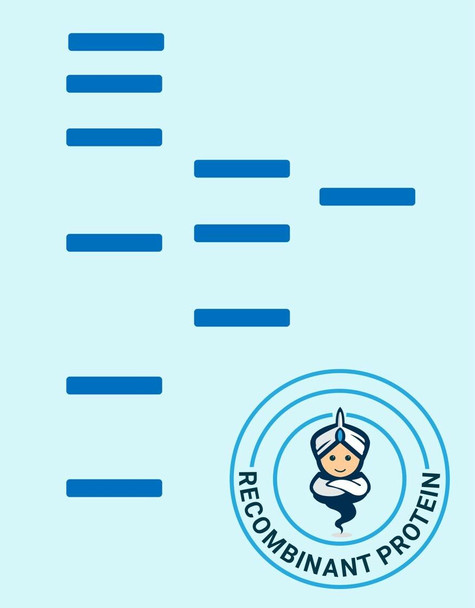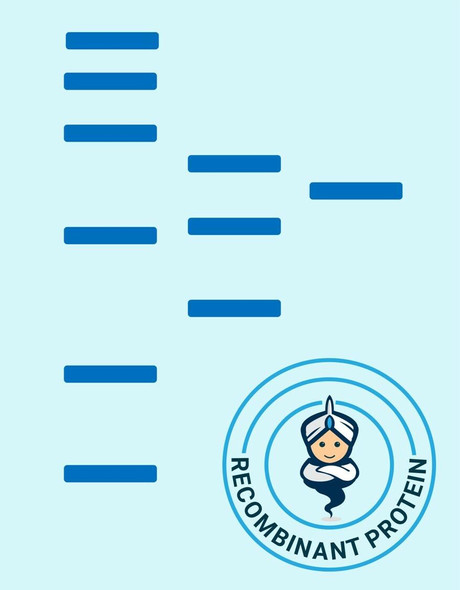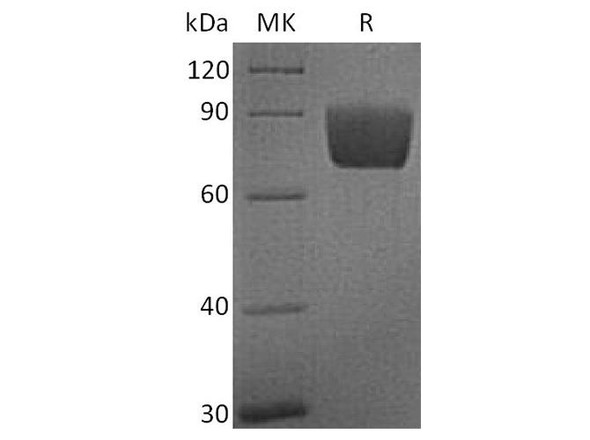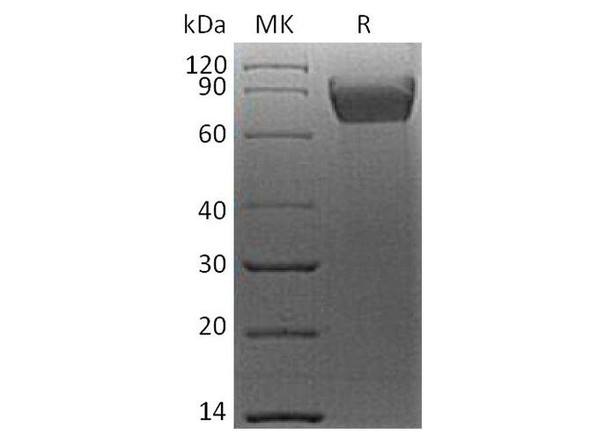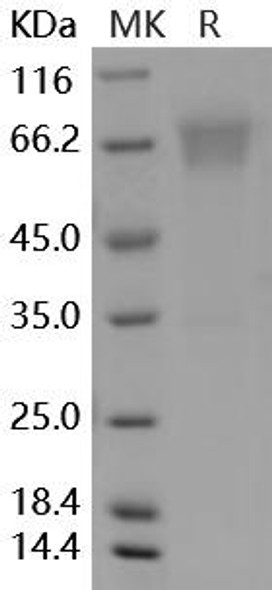Human VTCN1 Recombinant Protein (RPPB5141)
- SKU:
- RPPB5141
- Product Type:
- Recombinant Protein
- Species:
- Human
- Uniprot:
- Q7Z7D3
Description
| Product Name: | Human VTCN1 Recombinant Protein |
| Product Code: | RPPB5141 |
| Size: | 20µg |
| Species: | Human |
| Target: | VTCN1 |
| Synonyms: | V-set domain-containing T-cell activation inhibitor 1, B7 homolog 4, B7-H4, B7h.5, Immune costimulatory protein B7-H4, Protein B7S1, T-cell costimulatory molecule B7x, B7H4, VTCN1, B7S1, B7X, PRO1291, RP11-229A19.4. |
| Source: | Escherichia Coli |
| Physical Appearance: | Sterile Filtered colorless solution. |
| Formulation: | The VTCN1 solution (1mg/ml) contains 20mM Tris-HCl buffer (pH 8.0), 0.4M UREA and 10% glycerol. |
| Stability: | Store at 4°C if entire vial will be used within 2-4 weeks. Store, frozen at -20°C for longer periods of time. For long term storage it is recommended to add a carrier protein (0.1% HSA or BSA).Avoid multiple freeze-thaw cycles. |
| Purity: | Greater than 90.0% as determined by SDS-PAGE. |
| Amino Acid Sequence: | MGSSHHHHHH SSGLVPRGSH MGSLIIGFGI SGRHSITVTT VASAGNIGED GILSCTFEPD IKLSDIVIQW LKEGVLGLVH EFKEGKDELS EQDEMFRGRT AVFADQVIVG NASLRLKNVQ LTDAGTYKCY IITSKGKGNA NLEYKTGAFS MPEVNVDYNA SSETLRCEAP RWFPQPTVVWASQVDQGANF SEVSNTSFEL NSENVTMKVV SVLYNVTINN TYSCMIENDI AKATGDIKVT ESEIKRRSHL QLLNSKAS |
V-Set Domain Containing T Cell Activation Inhibitor 1, also known as VCTN1, is part of the B7 costimulatory protein family. Proteins in this family are located on the surface of antigen-presenting cells and interact with ligand bound to receptors on the surface of T cells. High level of the encoded protein has been associated with tumor progression. VCTN1 also takes part in promoting epithelial cell transformation.
VTCN1 Human Recombinant produced in E.coli is a single, non-glycosylated polypeptide chain containing 258 amino acids (25-259) and having a molecular mass of 28.2 kDa.VTCN1 is fused to a 23 amino acid His-tag at N-terminus & purified by proprietary chromatographic techniques.
| UniProt Protein Function: | VTCN1: Negatively regulates T-cell-mediated immune response by inhibiting T-cell activation, proliferation, cytokine production and development of cytotoxicity. When expressed on the cell surface of tumor macrophages, plays an important role, together with regulatory T-cells (Treg), in the suppression of tumor- associated antigen-specific T-cell immunity. Involved in promoting epithelial cell transformation. Belongs to the immunoglobulin superfamily. BTN/MOG family. 3 isoforms of the human protein are produced by alternative splicing. |
| UniProt Protein Details: | Protein type:Membrane protein, integral Chromosomal Location of Human Ortholog: 1p13.1-p12 |
| NCBI Summary: | This gene encodes a protein belonging to the B7 costimulatory protein family. Proteins in this family are present on the surface of antigen-presenting cells and interact with ligand bound to receptors on the surface of T cells. Studies have shown that high levels of the encoded protein has been correlated with tumor progression. A pseudogene of this gene is located on chromosome 20. Multiple transcript variants encoding different isoforms have been found for this gene. [provided by RefSeq, Dec 2011] |
| UniProt Code: | Q7Z7D3 |
| NCBI GenInfo Identifier: | 74759262 |
| NCBI Gene ID: | 79679 |
| NCBI Accession: | Q7Z7D3.1 |
| UniProt Secondary Accession: | Q7Z7D3,Q0GN76, Q45VN0, Q5WPZ3, Q6P097, Q9H6B2, |
| UniProt Related Accession: | Q7Z7D3 |
| Molecular Weight: | |
| NCBI Full Name: | V-set domain-containing T-cell activation inhibitor 1 |
| NCBI Synonym Full Names: | V-set domain containing T-cell activation inhibitor 1 |
| NCBI Official Symbol: | VTCN1�� |
| NCBI Official Synonym Symbols: | B7X; B7H4; B7S1; B7-H4; B7h.5; VCTN1; PRO1291�� |
| NCBI Protein Information: | V-set domain-containing T-cell activation inhibitor 1 |
| UniProt Protein Name: | V-set domain-containing T-cell activation inhibitor 1 |
| UniProt Synonym Protein Names: | B7 homolog 4; B7-H4; B7h.5; Immune costimulatory protein B7-H4; Protein B7S1; T-cell costimulatory molecule B7x |
| UniProt Gene Name: | VTCN1�� |

